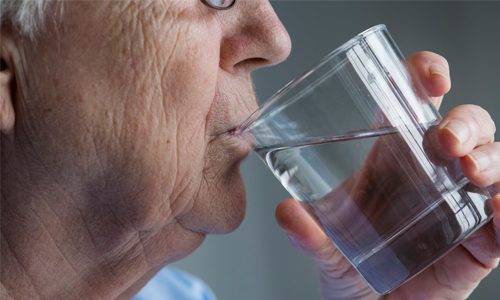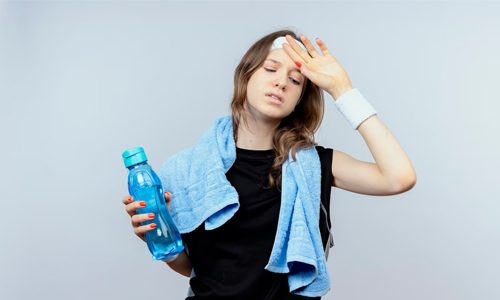It can be. Drinking too much water can lead to adverse health conditions, which can prove fatal if not treated properly.
Water is crucial for the body and needs to be consumed at regular intervals throughout the day. It is indispensable for all our daily activities and is of utmost importance for our survival. Factors, such as a person’s age, gender, and size play a major role in deciding the quantity of water that needs to be consumed on a daily basis. Drinking the right amount of water is one of the effective ways to improve overall health. Even though drinking water is essential, too much of it can lead to health complications. In this blog, let’s take a glimpse at the symptoms of drinking too much water and how to avoid it.
Water Poisoning
Drinking too much water can cause “water intoxication” or “water poisoning.” An excess intake of water can have a drastic effect on the electrolyte balance in your body. And, it can even increase the pressure inside your skull. Water poisoning can affect people participating in sporting events and patients with certain mental health conditions.
What Happens If You Drink Too Much Water?
There are several dangers of overhydration. When your water intake is more than the required amount, the quantity of water in the blood increases. This, in turn, dilutes the electrolytes present in the blood. Sodium is one of the important electrolytes in the blood, and when it gets diluted, it can result in severe health conditions.
In case the sodium level in the blood falls below 135 millimoles/liter, a condition known as “hyponatremia” can occur. You might know that sodium helps maintain the balance of fluids both inside and outside the cells. So, when the sodium level in the blood decreases, the fluids flow from the outside of the cells to the inside. This excess fluid inside the cells causes them to swell. When this process takes place in the brain cells, it can lead to life-threatening situations. Fluid build-up in the brain cells is called cerebral edema, which can cause a dysfunction of the central nervous system.
How Much Water Is Too Much?
Water intoxication is pretty rare because nobody can drink too much water by accident. However, it is common among endurance athletes. When they consume too much water without accounting for the electrolyte losses in the body, they end up with water poisoning. Soldiers drinking a lot more than the required amount of water during training sessions also face hyponatremia. Even compulsive water drinking by patients with certain types of mental illnesses results in water intoxication.
But how much water is too much? Many assume that they need to drink eight glasses of water per day. However, the reality is that this requirement varies according to the person’s health conditions, the amount of physical activity they perform, their body weight, the climate, etc. Breastfeeding women might need to consume more water than others in their age group because they will lose some amount of water while feeding their babies. Despite the water loss, women must not avoid breastfeeding their babies because there are several reasons why a mother should breastfeed her baby.
It’s best to avoid drinking more water than the amount the kidneys can eliminate. Although they can remove 20 to 28 liters of water a day, they are able to get rid of only 0.8 to 1 liter per hour. Doctors and health care providers usually estimate that people drinking 3 to 4 liters within a short period (which is not exactly stated) are prone to face hyponatremia.
Effects of Drinking Excessive Water
Nausea, vomiting, and headaches are some of the common side effects of drinking too much water. More severe symptoms of water intoxication include difficulty in breathing, muscle weakness, confusion, drowsiness, double vision, fatigue, seizure, etc. It can even result in loss of consciousness or coma in some individuals. And, if they are not treated properly, it can lead to death.
If you find a person suffering from the symptoms of water intoxication, get immediate assistance. Minutes can be crucial in such water intoxication treatments. The affected person can have a salty snack until professional help arrives because salt contains sodium.
Safe Daily Water Intake Guidelines
The quantity of water intake varies from one person to another. Older adults and athletes might require more water than others. However, one calculation regarding the amount of water (to be taken) may prove helpful. If an individual’s intake of calories is “N,” they must drink “N” milliliters of water a day. Drinking a lot more than this amount might cause them trouble.
For instance, if a person’s intake is 1500 calories a day, and they drink 2500 milliliters of water on a particular day, they might experience water intoxication.
However, not drinking enough water can also lead to problems, such as dehydration. It’s not necessary to take fluids only in the form of water. You can take fresh fruits and vegetables on a regular basis. These also add to the water content in your body.
Very less water intake can also cause other problems, apart from dehydration. Let’s see how drinking more water prevents heart disease.
Prevention of Heart Disease
Drinking a glass of water at night before going to bed is actually good for your health. Many cardiologists recommend it because this practice can prevent heart attacks at night. Heart attacks are more common at nights, and drinking water can lower the risks of heart disease. In addition, water can also prevent strokes at night.
The Bottom Line:
By now, you would have got the answer to your question, “Why is drinking too much water bad?” You have also learned that, sometimes, it can be fatal. Therefore, it is best to stick to a quantity that’s safe – not too much or too little. Carry a bottle of water while commuting to your workplace and also while traveling. And, don’t let your body get dehydrated, because it can make you drink too much water within a short period of time. Stay healthy, stay safe!






















